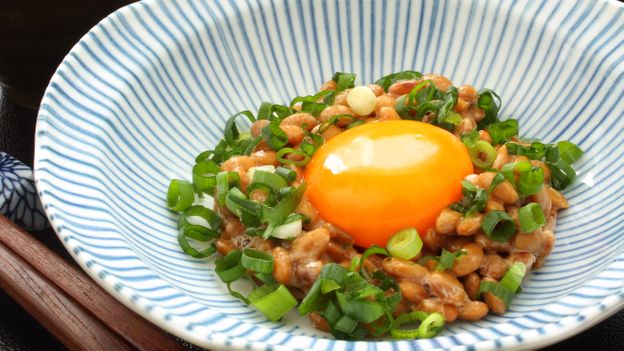

1. hailed (v)
to call someone in order to attract their attention
2.fermented (v)
to change chemically through the action of living substances, such as yeast or bacteria , or to use a substance to produce a chemical change
3. stinky (adj)
having or producing an unpleasant smell
4. polarising (v)
to cause something, especially something that contains different people or opinions, to divide into two completely opposing groups
5. risk (n)
the possibility of something bad happening
Japan's most polarising superfood?

The Japanese have long hailed natto as a superfood – but its ammonia-like smell and mucus-like consistency make the fermented soybean dish a turnoff for many.
Nattō is a traditional Japanese food made from fermented soybeans. It has an ammonia-like smell and mucus-like consistency that makes it polarising, even among people who grow up with it. Regardless, many eat it anyway because of the health benefits.
“Nattō is very stinky. You definitely notice the smell,” said Yuki Gomi, a Japanese chef who runs the cooking school Yuki’s Kitchen in London. “But I always have it in my fridge.” She says it’s a staple in her home, the same way that cheese and yoghurt is readily available in many Western households.
The Japanese have long hailed nattō as a superfood and believe that consumption is linked to improved blood flow and reduced risk of stroke – factors that are particularly appealing in a country that is home to one of the world’s oldest populations. Japanese news site SoraNews24 has gone as far as to declare that “a pack of natto a day keeps the death away”. Hitoshi Shirakawa, professor of nutrition and food science at Tohoku University’s Graduate School of Agricultural Science in Sendai, muses this is “probably true”.
He cites a long-term study published in the British Medical Journal earlier this year: researchers at the National Cancer Center in Tokyo found that men and women who ate fermented soy-based foods like nattō on a daily basis reduced their risk of dying from a stroke or heart attack by 10%.
Nattō might even help people feel and look younger. One serving (roughly 40-50g) has the same levels of vitamin K as the daily requirement set by the Japanese government and may help prevent osteoporosis. Nattō is also packed with vitamin B6 and vitamin E, which Shirakawa says boosts cell turnover and slows skin aging.
Resource: http://www.bbc.com/travel/story/20200727-japans-most-polarising-superfood

- In your opinion, is natto a good food or bad food?
- What are the medical benefits of natto?
“Want a long life? Eat fermented soy.”
Times of India

 Pre- advanced
Pre- advanced
